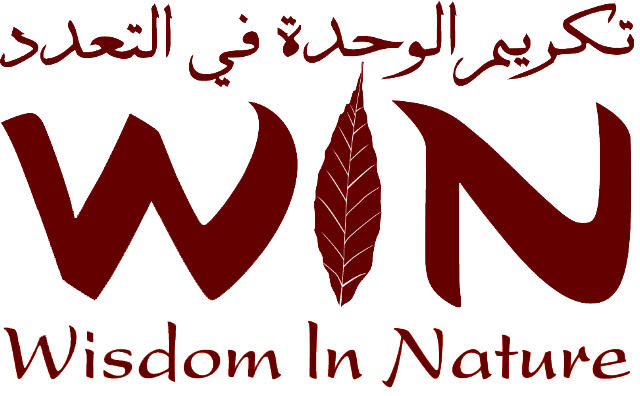Wisdom In Nature’s
Introductory Guiding Principles
1) NAME OF GROUP
Wisdom In Nature (WiN)
2) PRINCIPLES & VALUES
A) Relationship with Islam/Faith
i. We strive for an approach that is centred in the essence and unifying principles of Islam, allowing us to extend outwardly with inclusiveness to those of other faiths and beliefs.
ii. We do not represent all Muslims, nor the Islamic perspective (nor do we represent all ecological or community activists), and we do not have a monopoly on religion. Instead we represent a range of viewpoints, which will converge in some areas, to then be held with lesser or greater firmness.
iii. We are not a sect of Islam and are open to people of all faiths, sects and beliefs who are able to engage within our ethos.
iv. Our approach is non-prescriptive. We recognise that each individual has choice, and is on a life path of which we do not have full knowledge.
B) Transformational Activism (Individual, Group, & Societal)
a) Decision-making & Dialogue
i. We view Deep Dialogue and Reflection/Contemplation (Tafakkur) as important processes that inform our activism, and we recognise the value in allowing insights to emerge through them.
ii. We recognise the importance of creating space, both psychological and in time, to share and understand perspectives. This encourages a deeper dialogue through which the appreciation of others is enhanced, a prescriptive approach becomes less likely, and transformation becomes possible.
iii. Whilst technology has value, in an increasingly technology-driven age, we are mindful that face-to-face dialogue offers a quality and presence that can be missing through remote means.
iv. We aim to be transparent whilst allowing space for growth.
b) Development & Transformation
i. We look within as well as outside of the group, understanding that our personal and collective transformation is a crucial contribution to societal transformation ~ developing ourselves such that the consciousness and processes within the group mirror that of the world we wish to live in.
ii. We recognise the importance of spirituality/inner work, and our personal spiritual/inner development.
iii. We reflect on the natural world (which includes the human), and our place in it.
iv. We take opportunities to develop skills that will help the group to develop, for example skills in facilitating dialogue, conflict resolution and developing mindfulness.
v. We recognise that our means is a fundamental contribution to the end we seek.
c) Egoism & Image
i. We recognise the existence of egoism and take precautions to ensure that ego serves higher values, rather than attempts to push with a constricted world-view.
ii. Whilst through a collective identity we believe in the possibility of better fulfilling a higher purpose, we consider our purpose to ultimately be of greater value than our identity.
iii. We focus on substance in our work, which we value more than an image or impression that may or may not arise. We are also conscious of the importance of the truth being asserted.
iv. We value quality over quantity.
3) PURPOSE & METHODS
A) Our group purpose is to facilitate:
the transformation of society to live justly in harmony with the diverse natural world, of which we are a part, thus honouring the principle of Oneness (Tawhid). Integral to this is the process of community building and nurturing the social ecology.
B) In order to achieve this purpose we utilise the following methods:
a) Development of Knowledge
i. In recognising the interconnectedness of the world, we strive to develop our own understanding of human and societal spheres of knowledge, as well as the ‘environmental’. We recognise that economics, natural systems, peace, conflict, human ecology and social movements are realities that are interwoven together. We also aim to develop our understanding of Islamic perspectives on these areas, as well as perspectives from other traditions that may not be labelled ‘Islamic’ (where doing so supports the purpose of the group). Simultaneously, we allow space for our own insights to form.
ii. We also assume the role of a catalyst in order to stimulate questioning, reflection, dialogue and understanding of the above within wider society.
The vehicles that we might use include talks, workshops, the arts and various forms of media, as appropriate.
b) Connecting with Nature
We consider sensing, connecting with, and reflecting on the natural world as a potential vehicle for spiritual development, as well as a means to develop a deeper understanding of ecology. Hence outings in which we explore or work in nature form a component of our activism. We may also encourage such activities to be initiated in communities, where this is appropriate.
c) Deep Dialogue
Whilst communication enables us to understand one another, other factors are relevant to its quality: the state we are in, the quality of facilitation (which we regard as a collective responsibility) and the setting, can fundamentally affect the extent to which both the process and eventual outcome are infused with wholeness. Hence we aim to create conditions inwardly and outwardly that are conducive to such dialogue. Integral to this process is listening with compassion, as well as reflection and taking precaution against the influence of egoism.
d) Networking
We network with a diverse range of groups and individuals (both inside and outside Muslim communities), whilst also recognising that the quality of relationship is more important than quantity of contacts.
e) Campaigning/Outward Activism
In asserting justice, there are likely to be times when we exert direct pressure outwardly. Our work may include taking campaigns, where appropriate, to businesses, political structures and other institutions, for example. In so doing, we are simultaneously mindful of our principles and values, in particular recognising that the means we use is a fundamental contribution to the end we seek (see Transformational Activism earlier).
